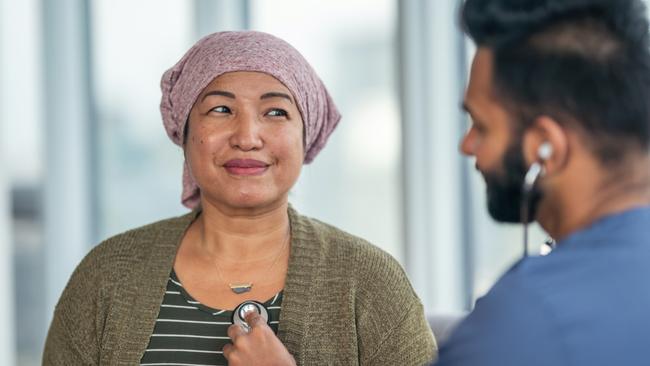Race submits key ethics application for phase I cancer trial
Race Oncology has submitted a human ethics regulatory package for its phase I trial in solid tumour patients using the RC220 bisantrene drug.

Race submits human ethics regulatory package for phase I trial in solid tumour patients using RC220 bisantrene
Up to 10 additional sites set to follow the first trial site with patient recruitment expected to start in Q1 CY25
Phase I study will investigate RC220 in combination with doxorubicin in adult cancer patients with solid tumours
Special Report: Race Oncology has submitted the ethics and regulatory package for its phase I clinical trial of RC220 bisantrene to the Bellberry Human Research Ethics Committee (HREC) at its lead site Southside Cancer Care Centre in Sydney, under principal investigator Dr Mahmood Alam.
Race Oncology (ASX:RAC) said the Southside Cancer Care Centre site would be activated following approval and recruitment of the first patient was expected in Q1 2025.
Regulatory and institutional packages have also been completed for submission to a second Australian site immediately following HREC approval of the trial, with both sites planned to be activated simultaneously.
Race said regulatory and institutional packages were also in advance preparation for multiple locations in Hong Kong and South Korea, with submissions anticipated in early Q1 2025.
The company said additional site evaluation and recruitment was ongoing with the aim of achieving 10 active sites.
Two-stage trial process
Race’s open-label, phase I trial of reformulated RC220 bisantrene as a cardioprotective anticancer treatment in solid tumour patients will be conducted in two stages.
Stage 1 will assess the safety and tolerability of ascending doses of RC220 alone, as well as in combination with standard-of-care (SOC) doses of doxorubicin (Adriamycin) in patients with advanced solid tumours.
The trial objectives of stage 1 are to identify the maximum tolerated combination dose (MTCD), the pharmacokinetics of RC220 and the effects of RC220 on a range of exploratory clinical biomarkers, including m6A RNA and cardiovascular capacity.
Race said the trial would use a Bayesian statistical design for the dose escalation stage, a design that has proven faster and more efficient than the traditional (3+3) dose escalation approach.
An interim analysis of all data from stage 1 will be performed after the last patient completes their first cycle of the combination treatment with the aim of identifying the optimal dose of RC220 in combination with doxorubicin.
In stage 2, Race said RC220 would be used to treat patients with solid tumours who have not previously received doxorubicin or other anthracyclines using the optimal combination dose.
Stage 2 will generate additional safety and tolerability data on the combination, cardioprotective (via VO2 peak measurements) and anticancer efficacy data, and the effects of RC220 on a range of biomarkers.
Subject to HREC approval, stage 2 is planned to commence while patients in stage 1 continue treatment according to the study protocol.
Reformulated drug reducing cardiotoxicity
Bisantrene is an anthracene-based chemotherapy drug originally developed by Lederle Laboratories in the 1970s and 1980s.
It is known for reducing cardiotoxicity and providing cardio-protection when used with anthracyclines, a class of cancer treatment drugs.
Although effective and approved for treating acute myeloid leukaemia in France, its complex administration hindered commercial success.
RC220 is a reformulated version of bisantrene for easy clinical use through standard infusion via arm or leg veins and Race is exploring its anticancer and cardio-protective properties.
Foundational clinical evidence to advance to phase II
Race said the phase I study would set the foundational clinical evidence from which to advance to larger phase II multi-region studies, including in the US, Europe and Asia.
The clinical development for bisantrene RC220 is aimed at showing its potential as cardioprotective anticancer agent to improve the health outcomes of cancer patients treated with anthracyclines.
CEO and managing director Dr Daniel Tillett praised the Race team and especially its Race clinical team for their efforts to reach this point in the clinical development of RC220.
“I also wish to thank George Clinical, the Cancer Care Foundation, and Dr Mahmood Alam for their support and advice,” he said.
“RC220 offers the potential to help millions of cancer patients avoid the detrimental side effects and accelerated-aging anthracycline chemotherapy can cause while also improving cancer treatment outcomes for cancer patients.”
Race chief medical officer Dr Michelle Rashford said the company had reached a critical milestone with selection and evaluation of an appropriate site and the start of the ethical review for the phase I study.
“Once we have the approval for the lead site, the team will focus on advancing patient recruitment as efficiently as possible to commence the assessment of the cardioprotective benefits of RC220 for patients treated with anthracyclines,” she said.
This article was developed in collaboration with Race Oncology, a Stockhead advertiser at the time of publishing.
This article does not constitute financial product advice. You should consider obtaining independent advice before making any financial decisions.


